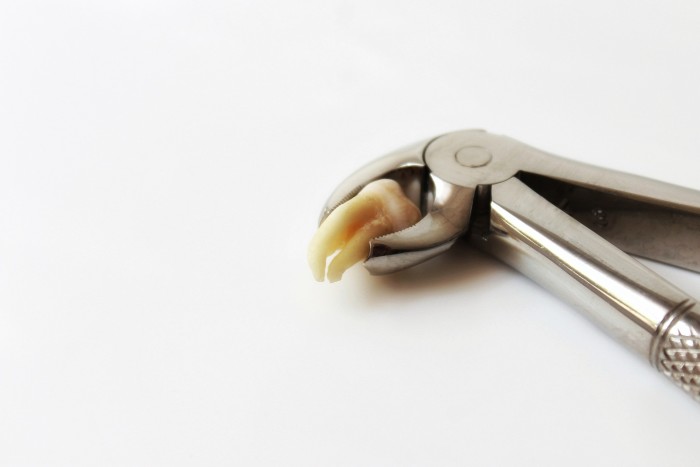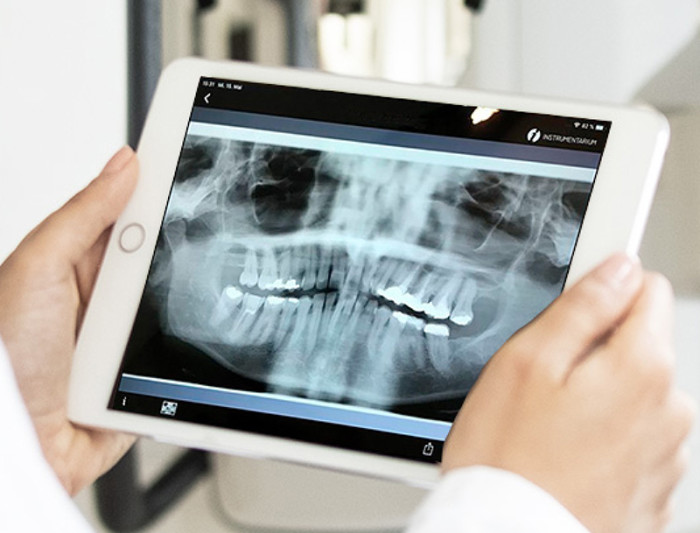Wisdom teeth: surgery, costs, pain and symptoms

Wisdom teeth – time and again, we hear the wildest horror stories about wisdom teeth being pulled, the anaesthesia or the pain after the operation. But what is really true about the myths that circulate abound wisdom teeth? We will clear this up and provide you with all the relevant facts and information that you should know about your wisdom teeth.
What is the job of the wisdom teeth?
Wisdom teeth are the eighth teeth in the upper and lower jaws. From the point of view of evolution, wisdom teeth used to be an effective tool for chopping up coarse food. Nowadays, wisdom teeth have no direct task. This is, for one thing, because they will no longer develop in around 20% of the population – so not everyone has wisdom teeth. Wisdom teeth have also lost their original purpose due to humans' changed eating habits. If the teeth develop anyway, they can serve as a useful chewing tool. Wisdom teeth usually form between the ages of 16 and 25.
How do you notice that your wisdom teeth are coming through? - Symptoms
We know from our evolutionary history that our ancestors had much larger jaws than humans do today. Due to the regression of the jaw, the wisdom teeth have less space, which is why they grow in the wrong place or at the wrong angle in many cases. If a wisdom tooth feels like it's pushing, this is usually the first symptom of eruption of a wisdom tooth. Those affected often report a feeling of pressure against the bones and skin, which is typical when the wisdom teeth erupt. There are also other symptoms, though, such as a dull throbbing in the gums near the throat or the neighbouring bone, which let you know that the wisdom teeth are coming through.
Other typical symptoms include redness, swelling, and difficulty swallowing or opening the mouth, which often makes eating painful. In the worst case, if the wisdom teeth are ingrown, serious infections can occur, which are then expressed as pain in the jaw, neck and throat area. Yet, headaches are also a common side effect of inflamed wisdom teeth. If the pain radiates to the head, this can sometimes be due to the fact that the wisdom teeth come up against the sinuses as they grow, thereby exerting pressure on the head. Aching wisdom teeth can also lead to swelling of the lymph nodes and in the face, which then makes wisdom tooth surgery unavoidable.
Why do wisdom teeth have to be extracted?
About 85% of all wisdom teeth have to be surgically removed over time. The most common reasons for extracting wisdom teeth include discomfort such as pain or inflammation. Pain in wisdom teeth is often the result of a lack of space in the jaw area. It is sometimes necessary to extract the wisdom teeth if there is a risk that the existing teeth will get damaged due to pressure from the wisdom teeth. Tooth decay can also be a reason for removing wisdom teeth. Due to the position of the teeth at the far back, they are difficult to reach during oral hygiene practices, which means that severe caries can accumulate. Wisdom teeth must also be extracted if there is hidden inflammation caused by bacteria, such as under the mucous membrane. If the wisdom teeth have to be extracted because of inflammation, it is important to wait for the gums to heal first in order to avoid heavy bleeding or impaired wound healing after the wisdom tooth surgery.
Wisdom tooth surgery
Wisdom tooth operations are performed either by the dentist or by the oral and maxillofacial surgeon. Depending on the number of wisdom teeth that need to be extracted, the treatment takes about 20 to 60 minutes. Patients can choose to have the wisdom teeth on just one side extracted, or all four wisdom teeth. Wisdom tooth surgery on just one side offers the advantage that patients can eat on a single side after the operation; however, another surgical appointment is needed after a few weeks to remove the remaining teeth.
The wisdom tooth operation begins once the anaesthesia has been given. A distinction is made between two treatment sequences. If the wisdom teeth are exposed and have been extensively broken through, or broken through in full, the dentist will simply pull them out with a pair of forceps. With more difficult wisdom tooth operations, in which the teeth have shifted or have an unusual shape, they are dissected and gradually ablated. To do this, the doctor slices open the gum over the wisdom tooth and detaches it from the bone. After the treatment, the wounds are sutured. After about seven to ten days, the sutures will be removed at a further appointment.
Wisdom tooth sedation – General anaesthesia or local anaesthesia?
If wisdom tooth surgery is needed, the patient is anaesthetised. A distinction is made between local anaesthesia and general anaesthesia. If the anaesthesia works correctly, wisdom tooth operations are usually painless. However, there can be an uncomfortable feeling of pressure, especially when the teeth are being extracted. The noises made by the instruments used the doctor's movements can also be perceived as unpleasant. It may be advisable to ask the doctor to explain each step so as not to be alarmed by possible unpleasantness.
Which form the doctor responsible ultimately decides on depends on the patient's individual case. For anxious patients, wisdom tooth surgery under general anaesthesia is often chosen. This generally takes the same length as a wisdom tooth operation under local anaesthesia – 20 to 60 minutes. Since general anaesthesia is very stressful for the body and can cause side effects such as headaches, nausea and drowsiness after the operation, it is only recommended to the patient in exceptional cases. General anaesthesia is also not suitable for patients with poor health, as the risks are then particularly high.

What to take into account after the wisdom tooth surgery
If you've had your wisdom teeth extracted, there are a few things to consider after the treatment: for one thing, you should refrain from smoking and drinking hot beverages, coffee or alcohol, as these can interfere with wound healing. It is also recommended to take things easy in the first few days after your wisdom tooth operation, and to refrain from exertion such as sport. This prevents unwanted secondary bleeding and promotes the formation of new bone mass in the fresh wound. Elevating the wound during sleep is also recommended. When brushing your teeth after a wisdom tooth operation, it is important to use a soft toothbrush.
For how long should you refrain from eating after wisdom tooth surgery?
After a wisdom tooth operation, you can basically eat as soon as you feel ready. However, you should only consume soft food (pureed food, baby food, soups, etc.) and water for the first few days after treatment. Coarser foods are not recommended, as they can cause food scraps to accumulate in the wound and increase the risk of infection. Dairy products should also be avoided for about a week after wisdom tooth surgery. The lactic acid bacteria it contains also promote inflammation and disrupt wound healing. In addition, eating dairy products after having your wisdom teeth removed can interfere with the effectiveness of any antibiotics.
How long does the pain last for after wisdom tooth surgery?
Pain is common after wisdom tooth surgery, but not in all patients. Depending on the magnitude of the procedure, it is very possible to experience a toothache or sore throat after treatment. Swelling in the cheeks is also normal. To combat this, you can, for example, cool with a cooling pad or a damp cloth. Pain killers such as ibuprofen or paracetamol can be taken to alleviate any possible pain in the first few days after wisdom tooth surgery. Which pain killer is ultimately taken to relieve the pain should always be clarified in advance with the attending physician. This avoids any possible secondary bleeding due to taking the wrong medication.
For how long will you be on sick leave after wisdom tooth surgery?
How long you will be on sick leave for after wisdom tooth surgery depends on several factors. For one thing, the duration of the sick leave period depends on the number of teeth being extracted. The healing process and the surgical method that is selected can also affect the number of days needed. Nevertheless, patients are given an average of 3–5 days to recover after wisdom tooth surgery. The appointment for the treatment is often also scheduled 2 to 3 days before the weekend, so as to allow the weekend to be used for a full recovery.
Extracting wisdom teeth – costs
The costs for extracting wisdom teeth are covered by the statutory health insurance providers. Additional costs incurred, for example, due to a wisdom tooth operation under general anaesthesia, are usually borne by the patient. The cost of removing the wisdom teeth under general anaesthesia is around 100 to 200 pounds depending on the doctor. There are exceptions to this in the case of, for example, anxious patients, who can expect to be reimbursed for general anaesthesia by presenting a certificate from a specialist in psychiatry or psychotherapeutic medicine.
For privately insured persons and patients with supplementary insurance, it is advisable to ask the relevant health insurance provider or insurance company about which costs will be covered in the event of wisdom tooth surgery under general anaesthesia. The costs they assume varies depending on the tariff.